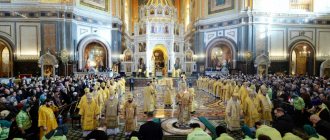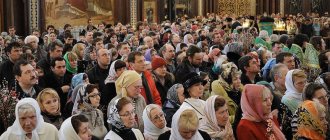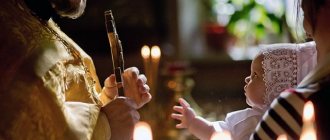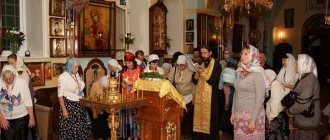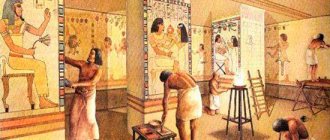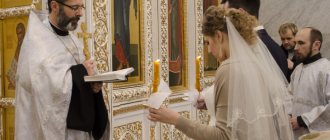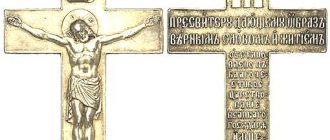If you came to church for the first time
How to behave correctly in church when visiting for the first time:
- Before arriving at the temple, you need to properly prepare. Waking up in the morning, wash your face, and then light the lamp and pray to the Almighty: thank the Lord for peace and tranquility;
- pay attention to your appearance. It is forbidden to wear shorts, jeans, or short skirts in God's house. Women are not allowed to wear trousers to church. Tie a scarf or handkerchief on your head; give up bright makeup. Men, on the contrary, take off their hats when entering church. Your clothing should not give other people reasons for embarrassment or temptation. Bare areas of the body are not allowed;
- When going to church, many people don’t think at all about whether they can eat beforehand. If you follow religious rules, you need to come to church only on an empty stomach. Exceptions are allowed for pregnant women and people with serious medical conditions;
- In various media, there is often a point of view that you do not need to enter the temple with bags. However, if there is a need for this, it is not forbidden to do so;
- enter the church with the obligatory bow: you must bow three times;
- You should prepare money at home in advance for candles and church fees: it is inconvenient to change them in the church itself. This will disturb everyone.
If there is a worship service
How to behave in church during worship:
- If the service has already begun, there is only one basic rule of behavior here - do not interfere with other people praying. It is advisable not to talk at all. Turn off your mobile phone in advance;
- Don't walk around the church: you might push someone. If a person came to church with a small child, and he began to cry, it is best to go with him outside or into the corridor. Wait until the baby has completely calmed down;
- You are allowed to sit on a bench only because you feel unwell or for medical reasons. Otherwise, the entire service must be on its feet;
- on holidays and on Sundays, instead of low bows, bows are made from the waist;
- men should be located on the right side of the temple, and women on the left;
- Some churches may have their own traditions: for example, passing a candle only over your left shoulder or cupping your hands when the priest speaks.
General rules of conduct in church
The church charter is a huge collection of rules to which clergy and Christians who visit the temple are subject. In the Orthodox world these dogmas are revered in a special way. For novice parishioners, there is even a Sunday school that teaches how to behave correctly as a churchgoer.
General rules of conduct in church
Appearance
Going to church is an important event for any Christian believer. The Temple of the Lord does not accept frivolity or a condescending attitude, and therefore, before going there, one must bring oneself into a form that complies with the regulations. For women and men, the rules are significantly different, but absolutely all parishioners must have a cross on their body, given to them at baptism. It is worth remembering that church is not a place for entertainment or dating, and therefore you need to look modest.
Rules for women
According to church canons, women are allowed to enter the temple only with their heads covered and in long skirts or dresses. During services they occupy the left side of the parish, and during monthly allocations they stand closer to the door, not approaching the altar. The same rule applies to those who have recently given birth. They are allowed to attend church only on the 40th day after giving birth, when the priest will read a cleansing prayer over them. Orthodox dogma prohibits women from:
- wear clothes that are too short or tight;
- wear revealing dresses that excessively expose the body (including a deep neckline);
- do bright, provocative makeup;
- use strong perfume.
Rules for men
The church is more lenient towards the stronger sex, but there are also restrictions for men:
- Before entering the temple, you must remove your headdress;
- clothing must be neat and clean;
- It is not allowed to wear a robe or tracksuit;
- the face should be thoroughly shaved;
- several hours before attending church you should not drink alcohol or smoke.
Men tend to occupy the right side of the ward. Similarly to women, they must behave respectfully, modestly, not talk loudly, and not disturb other parishioners.
Bows and sign of the cross
In front of the main gate of the temple, it is customary to make the sign of the cross followed by bowing the head. The same is done inside the church if there is a service. All actions are performed by parishioners synchronously at certain moments of the service:
- while singing the glory of Jesus Christ or the Holy Trinity;
- when proclaiming the phrases: “Lord, have mercy” and “Give, Lord”;
- at the end of the ceremony.
Rules for making the sign of the cross
When starting a prayer, finishing it, lighting a candle or approaching holy images, it is also necessary to cross yourself and bow. In this case, the action is performed slowly, thoughtfully, following certain rules:
- cross themselves with their right hand;
- the hand is folded into three fingers, connecting the first three fingers together;
- movements are made from right to left;
- first they touch the forehead, then the navel, and end with the right and left shoulders;
- Having completed the sign of the cross, they bow from the waist.
You need to bow only after the hand has completely lowered, so as not to break the cross being created on the body.
Author's advice
Appeals to priests and laity
It is customary to behave quietly in church, but sometimes there is a need to communicate with other parishioners or the priest. This can be done in a low voice, maintaining a respectful intonation. If someone else's shortcoming is noticed, you cannot ridicule or humiliate the person. You should approach him and delicately point out the error.
Temple servants are addressed according to their rank. During the greeting, the church charter does not allow a handshake from the side, but you can bow your head and put your lips to the right hand of the holy father. It is also strictly forbidden to interrupt the priest from worship or prayer. You should wait until the end of the ceremony and then make your request.
How to pray correctly?
Prayer is a dialogue between God and man, and in church the Lord hears us best. First of all, it is necessary to attend liturgies. Prayers need to be learned; it is important to understand them.
If there is no service in the church, it is permissible to pray at any icon. You can read the prepared text recorded in church books, or you can say the prayer in your own words. The main condition here is sincere faith.
In certain places of worship it is compulsory to be baptized. Finding out about this is not at all difficult: just watch the priest and the actions of other people. You cannot light candles during the liturgy: wait until it is over.
During worship, you need to be as attentive as possible: try to understand the meaning of the words you hear.
How to venerate icons?
Cross yourself twice and bow, and then kiss the image. Remember that you cannot kiss saints on the face. You should touch the image of the hand or the edge of the saint’s robe.
A woman’s lips should not be made up at this moment. There is an opinion that one should not venerate the faces of saints for reasons of hygiene. However, clergy assure that there are no germs on church icons; this is proven by science.
If for some reason a person does not want to venerate the faces of saints, then it is worth remembering that this is just a custom, but in no case an obligation.
Believers should attend worship services regularly
“If anyone, a bishop, or a presbyter, or a deacon, or one of those numbered among the clergy, or a layman, does not have any urgent need or obstacle, by which he would be removed from his church for a long time, but is in the city, on three Sundays over the course of three weeks, does not come to the church meeting: then the cleric will be expelled from the clergy, and the layman will be removed from communion” (80th Ave. of the 6th Ecumenical Council)
This is how Balsamon explains the reason for this punishment:
“... for from this one of two things is revealed - either that he does not take any care in fulfilling the divine commands to pray to God and sing songs, or he is not faithful. For why, within twenty days, did he not want to be in church with Christians and have fellowship with the faithful people of God?” (interpretation of Balsamon at 80th Ave. of the 6th Ecumenical Council)
“On weeks and on holidays, command not to do anything, but to come to church, as befits a Christian: whoever does this during the week and on holidays, let him be excommunicated.” (Article 162 of the Nomocanon at the Great Trebnik).
How to contact a priest?
Church ministers are always addressed only as “you”;
they are not greeted with the words we are used to (for example, hello). You need to say “bless”; at the same time, fold your hands in a cross with your palms up - the right one should lie on top . It is not customary for priests to shake hands.
If you need to invite the priest home, this can be done either in person or by calling the temple. But you shouldn’t start frank conversations on the phone, much less confess.
Father has a name; when addressing him, you should say: “Father Alexey.” If the name is unknown to you, simply say “father.” If the need arises to contact a priest in writing, it is appropriate to write “Your Reverend.” An integral part of the life of a Christian is repentance.
Don’t wait for the priest to ask you and pry for information. Start saying it yourself: confession is a feat. Confess your sins honestly to the priest. At the end, you need to kneel and listen to the final prayer. It is not customary to thank the priest: just kiss his hand goodbye.
Appeal depending on the rank of the clergyman
The priests themselves always talk about themselves in the third person; their wives are usually called mothers (for example, Mother Anna). If you came to the priest during some holiday, do not forget to mention this. For example, say “Christ is Risen!” if it is Easter.
The deacon is called father; those of priestly rank are called “Your Reverence.” But this is accepted in the official environment; People address a representative of such rank simply: “Father!”
The Patriarch and Metropolitan are told “Your Holiness!” There is also a “folk” version: Vladyko. This word elevates the minister of the church above all other titles.
Communion rules
It is recommended to take the sacrament every Sunday; to do this, you need to go to confession with a priest on Saturday. On the day of Communion, you cannot eat or drink from 12 o'clock at night; exceptions can be made only for health reasons and for pregnant women. Before communion, it is also necessary to make peace with loved ones, ask for forgiveness from those who may have been offended and ask the Lord for forgiveness for all sins, read the prayer rule. There is also a special post.
Communion in an Orthodox church
Communion is performed after confession and the priest's prayer of permission, with the exception of children under 7 years old - they can receive communion just like that. The process of taking communion is as follows:
- After the announcement of Communion, one must slowly, without haste, approach Holy Communion.
- While waiting for your turn, there is no need to push or wave your arms - this is a holy sacrament.
- Having received communion, you must kiss the Chalice and leave.
- Drink the drink standing on the table nearby.
- Venerate the priest's Cross and make the sign of the cross.
Advice! You need to go to church every Sunday, as well as on holidays. Children should be taught to attend church regularly.
During the Divine Liturgy, you can give notes to the priest about the health of loved ones and the repose of the dead. You can serve them in the same place where you can buy candles before the service.
Church Receptions
In the practice of the Orthodox Church, the organization of ceremonial receptions is accepted. They are usually held during major Orthodox holidays. The buffet does not require seating and lasts no more than two hours. Guests serve themselves.
But for a festive lunch or dinner, invitations are sent out in advance. It is always customary to begin meals with common prayer. Greeting speeches are usually exchanged between only two people: the host of the celebration and the main guest.
The rules of good manners do not approve of the appearance of a lady in a trouser suit, but it is acceptable to come to a celebration without a headdress. You can only take bread with your hands: break it off into small pieces.
Fruits are cut into small slices; they cannot be bitten off. Don't eat off the knife; Do not use a spoon where a fork is intended. If a cutlery falls, there is no need to look for it and pick it up. Just ask for a new one. Don't get carried away with strong drinks.
If there is a toast addressed to the patriarch, it is customary to end it with the words: “Many years to come!” The person who made such a toast approaches the Holy One with a glass in his hand, clinks his glass, and then kisses the hand of the church representative.
How should you leave the temple?
When leaving God's house, you should cross yourself in front of its main entrance.
In this case, the thoughts with which you left the temple will be very important. Try to take it out of the church and keep within yourself for as long as possible the bliss that you received.
The ideal end result is one in which a person enters the church one way and leaves completely different. Most likely, this will not be achieved immediately, but it is imperative to strive for the ideal.
On the way home, remember what was sung at the liturgy; think about the meaning of the words spoken there. You should not take seriously the instructions that elderly parishioners love to give out.
This may concern the rules of the procedure for placing candles or the correct reading of the prayer. However, if the words spoken are friendly and do not offend you in any way, this can even be beneficial.
On the way to the temple
The temple is a place of prayer. And it is necessary to tune into a prayerful mood while on the road. For this purpose, it is good to read short prayers to yourself to the Lord, the Most Holy Theotokos, the Guardian Angel, the troparion of the holiday, etc.
Sometimes you can see people walking towards the temple in a noisy crowd, talking and gossiping. Perhaps they will not talk in the temple and will behave outwardly reverently. But will they be able to tune their hearts to prayer? Bring your thoughts and feelings into silence.
